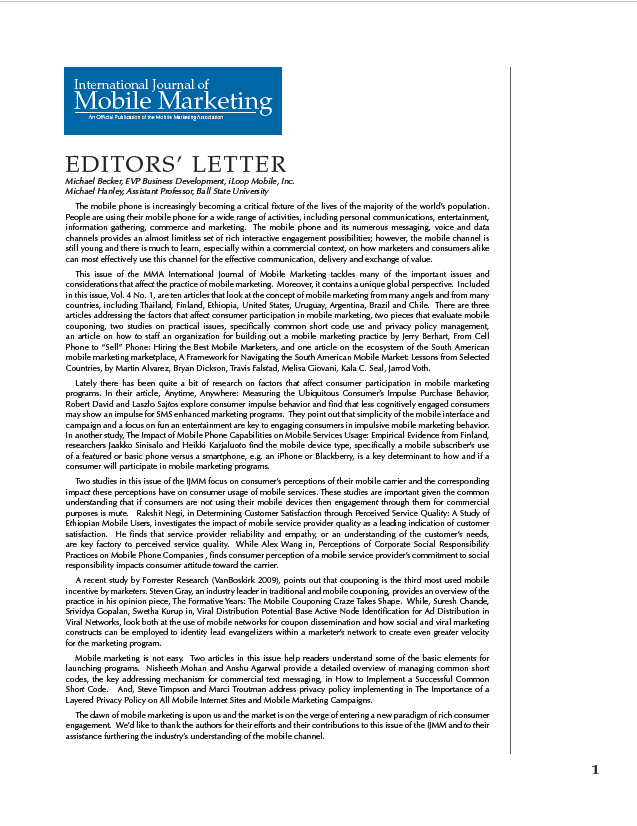International Journal of Mobile Marketing (IJMM) Vol. 4 No. 1 Editors’ Letter
The mobile phone is increasingly becoming a critical fixture of the lives of the majority of the world’s population. People are using their mobile phone for a wide range of activities, including personal communications, entertainment, information gathering, commerce and marketing. The mobile phone and its numerous messaging, voice and data channels provide an almost limitless set of rich interactive engagement possibilities; however, the mobile channel is still young and there is much to learn, especially within a commercial context, on how marketers and consumers alike can most effectively use this channel for the effective communication, delivery and exchange of value.

This issue of the MMA International Journal of Mobile Marketing tackles many of the important issues and considerations that affect the practice of mobile marketing. Moreover, it contains a unique global perspective. Included in this issue, Vol. 4 No. 1, are ten articles that look at the concept of mobile marketing from many angels and from many countries, including Thailand, Finland, Ethiopia, United States, Uruguay, Argentina, Brazil and Chile. There are three articles addressing the factors that affect consumer participation in mobile marketing, two pieces that evaluate mobile couponing, two studies on practical issues, specifically common short code use and privacy policy management, an article on how to staff an organization for building out a mobile marketing practice by Jerry Berhart, From Cell Phone to “Sell” Phone: Hiring the Best Mobile Marketers, and one article on the ecosystem of the South American mobile marketing marketplace, A Framework for Navigating the South American Mobile Market: Lessons from Selected Countries, by Martin Alvarez, Bryan Dickson, Travis Falstad, Melisa Giovani, Kala C. Seal, Jarrod Voth.
Lately there has been quite a bit of research on factors that affect consumer participation in mobile marketing programs. In their article, Anytime, Anywhere: Measuring the Ubiquitous Consumer’s Impulse Purchase Behavior, Robert David and Laszlo Sajtos explore consumer impulse behavior and find that less cognitively engaged consumers may show an impulse for SMS enhanced marketing programs. They point out that simplicity of the mobile interface and campaign and a focus on fun an entertainment are key to engaging consumers in impulsive mobile marketing behavior. In another study, The Impact of Mobile Phone Capabilities on Mobile Services Usage: Empirical Evidence from Finland, researchers Jaakko Sinisalo and Heikki Karjaluoto find the mobile device type, specifically a mobile subscriber’s use of a featured or basic phone versus a smartphone, e.g. an iPhone or Blackberry, is a key determinant to how and if a consumer will participate in mobile marketing programs. Two studies in this issue of the IJMM focus on consumer’s perceptions of their mobile carrier and the corresponding impact these perceptions have on consumer usage of mobile services. These studies are important given the common understanding that if consumers are not using their mobile devices then engagement through them for commercial purposes is mute. Rakshit Negi, in Determining Customer Satisfaction through Perceived Service Quality: A Study of Ethiopian Mobile Users, investigates the impact of mobile service provider quality as a leading indication of customer satisfaction. He finds that service provider reliability and empathy, or an understanding of the customer’s needs, are key factory to perceived service quality. While Alex Wang in, Perceptions of Corporate Social Responsibility Practices on Mobile Phone Companies , finds consumer perception of a mobile service provider’s commitment to social responsibility impacts consumer attitude toward the carrier.
A recent study by Forrester Research (VanBoskirk 2009), points out that couponing is the third most used mobile incentive by marketers. Steven Gray, an industry leader in traditional and mobile couponing, provides an overview of the practice in his opinion piece, The Formative Years: The Mobile Couponing Craze Takes Shape. While, Suresh Chande, Srividya Gopalan, Swetha Kurup in, Viral Distribution Potential Base Active Node Identification for Ad Distribution in Viral Networks, look both at the use of mobile networks for coupon dissemination and how social and viral marketing constructs can be employed to identity lead evangelizers within a marketer’s network to create even greater velocity for the marketing program.
Mobile marketing is not easy. Two articles in this issue help readers understand some of the basic elements for launching programs. Nisheeth Mohan and Anshu Agarwal provide a detailed overview of managing common short codes, the key addressing mechanism for commercial text messaging, in How to Implement a Successful Common Short Code. And, Steve Timpson and Marci Troutman address privacy policy implementing in The Importance of a Layered Privacy Policy on All Mobile Internet Sites and Mobile Marketing Campaigns.
The dawn of mobile marketing is upon us and the market is on the verge of entering a new paradigm of rich consumer engagement. We’d like to thank the authors for their efforts and their contributions to this issue of the IJMM and to their assistance furthering the industry’s understanding of the mobile channel.
Michael Becker is an intentionally recognized identity & personal information management solutions strategic advisor, speaker, entrepreneur, and academic. He advises companies on personal information economy business strategy, product development, business development, and sales & marketing strategies. He also represents them at leading trade groups, including the Mobile Ecosystem Forum. Michael is an advisor to Assurant, Predii, Privowny, and Phoji. He is the co-author of Mobile Marketing for Dummies and a number of other books and articles related to mobile marketing, identity, and personal information management. He is on the faculty of marketing of the Association of National Advertisers and National University. A serial entrepreneur, Michael founded Identity Praxis, co-founded mCordis and The Connected Marketer Institute, was a founding member of the Mobile Marketing Association (MMA), and was on the MMA board of directors for ten years and was MMA’s North American Managing Director for three years. In 2004, Michael co-founded iLoop Mobile, a leading messaging solutions provider. In 2014, Michael was awarded the 2014 Marketing EDGE Edward Mayer Education Leadership Award for his commitment to marketing education.

